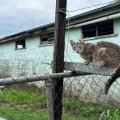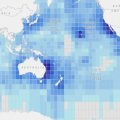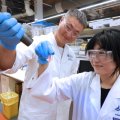A UQ academic’s research into whether nature or nurture influences the development of gut flora has been published in Nature and may hold the key to understanding obesity.
Dr Florent Angly said the fundamental research was significant since some forms of obesity could be caused by the action of microbiota.
“It is necessary to include phages, or viral predators, in the discussion of microbial communities to get an accurate understanding of how gut flora complements the digestive process.
“This study represents an early step in this direction.
“In the future, it is very likely that our improved understanding of the viral and microbial communities residing in our guts will result in better, personalised dietary advice or the creation of nutritional complements such as pro-biotics to improve our health and wellbeing,” Dr Angly said.
Dr Angly, a Postdoctoral Research Fellow from UQ’s Advanced Water Management Centre (AWMC), was part of a team based in California who studied viral (phage) communities in the digestive tracts of mothers and their twin children.
Dr Angly said the study showed environmental factors largely shaped viral gut flora, as twins displayed large inter-personal variations.
“Twins have an identical genome, so including twins in the study was designed to find out what is more important to determine gut flora, nature (the genome of an individual), or nurture (one’s health and dietary habits).
Dr Gene Tyson, Senior Research Fellow at the Advanced Water Management Centre, said Dr Angly was an extremely talented researcher and this publication represented another significant contribution to the field of microbial ecology.
“Dr Angly joined my group in the AWMC in January and will be our first postdoctoral researcher in a new centre dedicated to environmental genomics and microbial ecology, the Australian Centre for Microbial Systems Ecology," Dr Tyson said.
“We are excited to have Dr Angly as a part of our team and look forward to generating further high impact publications.”
Director of the AWMC Professor Jurg Keller said this accomplishment confirmed the strength of the staff at the AWMC.
“The publication also demonstrates that the research at the AWMC is indeed at the leading edge of scientific discoveries," Dr Keller said.
“Getting a publication in Nature is a major achievement for any researcher, and is particularly rewarding for a young scientist such as Dr Angly.
“Our strong focus is to foster such ground-breaking scientific discoveries and utilise them to help understanding and addressing practically relevant challenges in the water and environmental biotechnology fields.”
Dr Angly’s collaborators included Alejandro Reyes, Matthew Haynes, Nicole Hanson, Andrew C Heath, Forest Rohwer and Jeffrey I Gordon.
The abstract is online at: http://www.nature.com/nature/journal/v466/n7304/abs/nature09199.html
Media: Dr Florent Angly on f.angly@awmc.uq.edu.au or 07 3346 7211; Abby Campbell at the Faculty of Engineering, Architecture and Information Technology on abby@uq.edu.au or 07 3346 7696.
.jpg)










